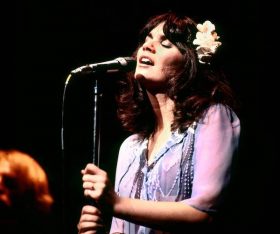

It feels like it doesn’t take much anymore to become famous. Andy Warhol would have either been intrigued or horrified by YouTube if he were alive today. Being famous for who you are and not what you do seems to be the American way in the 21st century so far.
Which is why it’s so refreshing to be reminded of what a true artist looks like, someone with a real talent, who honed a career not out of how many likes she got, but for how many records she sold and how many her music affected.
talent, who honed a career not out of how many likes she got, but for how many records she sold and how many her music affected.
Even though there have been many singers through the years who have been popular and successful, it just feels like Linda Ronstadt has always been different. It’s simple enough to say that, but when you look at her life and her career in its entirety, as is presented in the new documentary, Linda Ronstadt: The Sound of My Voice, you realize the breadth and scope of her talent and depth of her desire to stay true to her art and to who she is. And it’s a heartbreaking sadness, what she’s going through now, as Parkinson’s has robbed her of the one thing that she always believed defined her: her voice. But, as we learn in this documentary from directors Rob Epstein and Jeffrey Friedman, we see that she’s so much more than that. Besides all the awards and gold records, she played a vital role in the music industry in the 70s and early 80s in so many ways that a mere 95-minute documentary can’t even begin to cover what a legendary influence and talent Linda Ronstadt is.
But it’s not my job here to tell you what an icon Linda Ronstadt is—plus, I don’t have enough time. It is, however, my job to tell you whether this documentary succeeds in telling her story in a way that moves and enlightens you, whether you’re a fan or not.
What really works about this documentary is the complete picture it paints of an artist. It’s not just fan service, playing concert footage of the hits (although, don’t worry, there is a lot of that). Instead, it focuses on Ronstadt as a consummate and driven performer who didn’t let anyone else call her shots. Back when she started in 1965, this was unusual for a woman, especially a 19-year old. She already was fighting uphill, being a solo female singer who didn’t write her own songs. But she had two things going for her: her guts and that voice. Now to tell it, it would seem like Ronstadt was a fiery ball-buster, radiating confidence, who bulldozed her way to the top by sheer force, like a Streisand or Madonna. What unfolds, however, is the story of a unique combination of groundedness, likeability, talent and ambition that allowed Ronstadt to write her own rules in an industry that is very difficult for a woman to succeed in, let alone control their own destiny. She wanted to tell her own story, and that included the story of her father and her ancestors. She embraced her Mexican heritage and wanted to pay tribute to that in music. She wanted to play in multiple genres, and she took risks at the peak of her career that probably would have been professional suicide for anyone else. Nobody controlled her, nobody defined her.
Epstein and Friedman paint this picture with vivid strokes, employing three key narrative tools: interviews, archival footage and voiceover narration. Perhaps the most effective and affecting of these three is the voiceover narration, which is done by Ronstadt herself (now 73), as she walks us through her life and career. From the very beginning, the irony is not lost on us of how, even though Linda Ronstadt is still very much with us, her otherworldly singing voice is not, and yet it is her speaking voice that serves as our guide. It is this ever-present melancholy that lifts Linda Ronstadt: The Sound of My Voice, up from being just another rock-umentary.
There are some pretty amazing interviews as well, from Dolly Parton to Kevin Kline to Don Henley, as the filmmakers let Ronstadt’s peers provide the color commentary to a career that was unmatched in its influence and breadth. But it is still the archival footage of her singing, from the studio to the stage, from intimate clubs to stadiums, where the audience is drawn in to that incredible, soaring, perfect tone that can hit all notes with ease and can touch the deepest recesses of your soul.
Epstein and Friedman spend less time on Ronstadt’s personal life, even though there is something to chew on there too, from her high-profile dating life (including a then-Governor Jerry Brown, who happened to be running for President at the time) to a brush with drug use, all things that made headlines back in the day. Even though she was sometimes controversial with her outspoken political beliefs, she was never disliked—a rare feat indeed. Linda Ronstadt: The Sound of My Voice is wholly a tribute to a performer, an artist and a pioneer whose story is as textured and interesting as the songs she sings.
